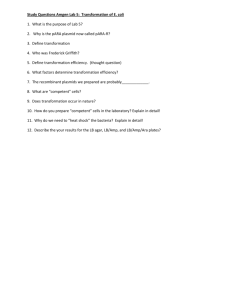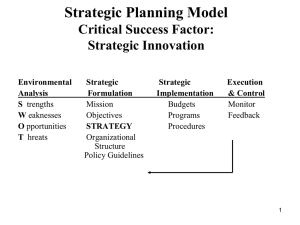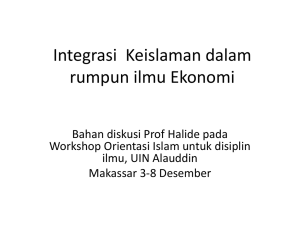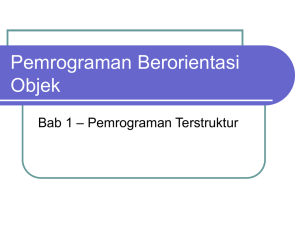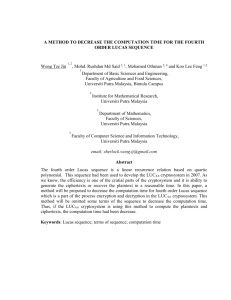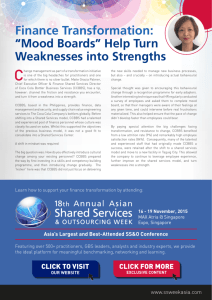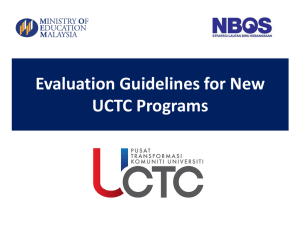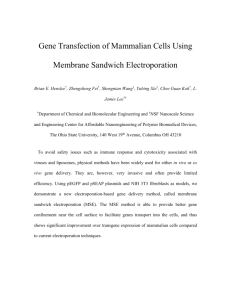UNIVERSITI PUTRA MALAYSIA VU THI QUYNH CHI FBSB 2013 2
advertisement
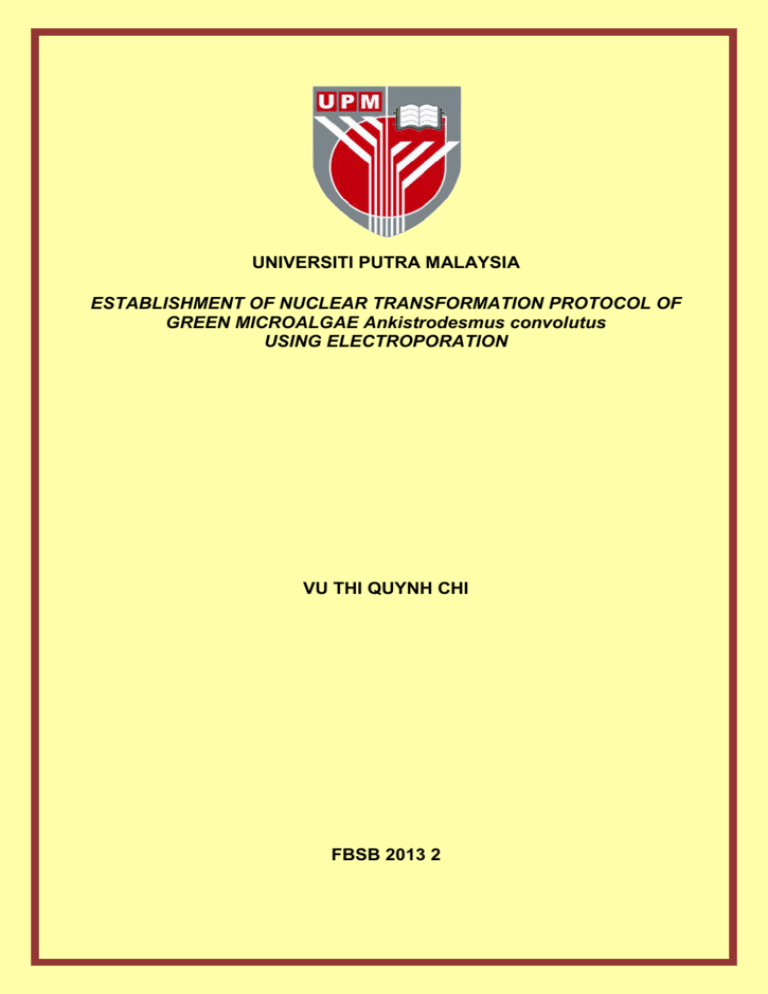
UNIVERSITI PUTRA MALAYSIA ESTABLISHMENT OF NUCLEAR TRANSFORMATION PROTOCOL OF GREEN MICROALGAE Ankistrodesmus convolutus USING ELECTROPORATION VU THI QUYNH CHI FBSB 2013 2 T U PM ESTABLISHMENT OF NUCLEAR TRANSFORMATION PROTOCOL OF GREEN MICROALGAE Ankistrodesmus convolutus USING ELECTROPORATION © C O PY R IG H VU THI QUYNH CHI MASTER OF SCIENCE UNIVERSITI PUTRA MALAYSIA 2013 H T U PM ESTABLISHMENT OF NUCLEAR TRANSFORMATION PROTOCOL OF GREEN MICROALGAE Ankistrodesmus convolutus USING ELECTROPORATION IG By © C O PY R VU THI QUYNH CHI Thesis submitted to the School of Graduate Studies, Universtiti Putra Malaysia, in Fulfilment of the Requirements for the Degree of Master of Science February 2013 my beloved husband, Dr. Tran Thanh PM The thesis was dedicated to my parents, Mr. Vu Van Tro and Mrs. Nong Thi Ngoc U my mother-in-law, Mrs. Nguyen Thi Hoan H my nieces and nephews T my brothers and sisters IG for their endless love and sacrifice as well as their encouragement which © C O PY R led me to this achievement. ii Abstract of thesis presented to the Senate of Universiti Putra Malaysia in fulfillment of the requirement for the degree of Master of Science By T February 2013 U VU THI QUYNH CHI PM ESTABLISHMENT OF NUCLEAR TRANSFORMATION PROTOCOL OF GREEN MICROALGAE ANKISTRODESMUS CONVOLUTUS USING ELECTROPORATION H Chair: Assoc Professor Suhaimi B Napis, PhD R IG Faculty: Biotechnology and Biomolecular Sciences Despite the availability of some expression systems such as mammalian cell, PY yeast, bacteria, insect cell, and fungi, green microalgae have risen as interesting alternative systems for the expression of recombinant proteins. The O world of algae is tremendously diverse but the number of species exploited for C biotechnological applications is quite limited due to the lack of transformation system and molecular information. As a green microalgae, Ankistrodesmus © convolutus is a fast growing green microalgae species that contains appreciable amount of carotenoids, polyunsaturated fatty acids and lutein which make this speciesapotential feed in poultry industry. Development of a transformation protocol for this species is essential prior to any of its application for gene manipulation. This study was aimed to establish a nuclear transformation iii protocol for A. convolutus using electroporation method. The expression vector, pEXP-GUS was created by the modification of pMDC-141 vector. This expressionvectorharbors a β-glucoronidase encoding gene (gusA) and ahygromycin phosphotransferase gene (hpt) conferringhygromycin resistance PM driven by double CaMV35S promoter. Minimal inhibitory concentration test of hygromycin showed that non-transformed A. convolutus was inhibited at the parameters of electroporation including cell U concentration of 40 mg/L in solid medium after 10 days of inoculation. The treatment, electric pulse, T concentration of expression vector, concentration of carrier DNA (salmon sperm H DNA) and cuvette width were optimized. The results of this study showed that highest transformation efficiency of A. convolutus was obtained when usingcells IG treated with cellulase (2%) and pectinase (0.3%) before transformation and R electric pulse of 1800 V. The optimal concentrations of the expression vector and carrier DNA were10 µg/mL and 50 µg/mL, respectively. Electroporation PY cuvette with 4 mm gap was more efficient than the 2 mm gap cuvette in introducing foreign gene into A. convolutus. The highest transformation O efficiency was 481 transformants per µg DNA use and the transformation yield C was 48 x 10-6 cells. A total of 14 transformants were obtained after six rounds of subculturing. The presence of transgenes including hpt gene and gusA gene © were then analyzed by PCR and Southern blot analysis. The resultsrevealed the presence of both hpt gene and gusA gene in three transformants namely AcG3, AcG4, AcG14. Among these three A. convolutus transformants, only one transformants gave hybridization signal when the XbaI-digested genomic DNA of PCR-positive transformants was hybridized to a biotin-labelled gusA gene- iv specific probe. This result implied the integration of gusA into the genomes of the transformed cells. The present study was successful in introducing the foreign genes into A. convolutus using electroporation. Hence,this success facilitates the expression of foreign genes in this algae species. It is now PM feasible to exploit A. convolutus as an alternative system for the expression of recombinant proteins. Particularly, the prospective of using transgenic A. U convolutus as oral vaccine or source of recombinant lutein for poultry can be © C O PY R IG H T examined. v Abstract tesis yang dikemukakan kepada Senat Universiti Putra Malaysia sebagai memenuhi keperluan untuk ijazah Master di Sains PM PENYEDIAAN PROTOKOL TRANSFORMASI NUKLEAR UNTUK MIKROALGAE HIJAU ANKISTRODESMUS CONVOLUTUS MENGGUNAKAN KAEDAH ELEKTROPORASI U Oleh VU THI QUYNH CHI T Februari 2013 H Pengerusi : Profesor Madya Suhaimi B Napis, PhD IG Fakulti: Bioteknologi dan Sains Biomolekul R Walaupun terdapat beberapa jenis sistem ekpresi gen seperti sel mamalia, yis, PY bakteria, sel serangga and kulat, mikroalgae hijau telah dibangunkan sebagai sistem alternatif yang menarik untuk mengekpreskan rekombinan protein. O Dunia algae adalah penuh dengan kepelbagaian tetapi bilangan spesies yang dieksploitasikan untuk bioteknologi adalah agak terhad disebabkan kekurangan C sistem transformasi dan maklumatbiologi molekul. Ankistrodesmus convolutus © adalah sejenis spesis mikroalgae hijau yang tumbuh dengan cepat dan mengandungi jumlah karotenoid, asid lemak poli tak tepu dan lutein yang ketara menjadikan spesies ini berpotensi diganakan sebagai makanan didalam industri penternakan haiwanPenyediaan protokol transformasi untuk spesies ini adalah penting untuk sebarang aplikasi bagi manipulasi gen. Kajian ini adalah vi bertujuan untuk membangunkan protokol transformasi untuk A. convolutus menggunakan kaedah elektroporasi. Vektor ekspresi, pEXP-GUS telah dihasilkan melalui pengubahsuaian vector pMDC 141. Vektor ekspresi ini membawa gen pengekod β-glucoronidase (gusA) dan gen hygromycin PM phosphotransferase (hpt) yang membolehkan rintangan terhadap hygromycin dikawalatur oleh promoter CaMV35S yang berganda. Ujian kepekatan U perencatan minimal terhadap hygromycin menunjukkan bahawa A. convolutus yang tidak ditransformasikan direncat pada kepekatan 40 mg/L dan 20 mg/L T dalam media pepejal BBM selepas hari 10 dan dalam media cecair BBM setelah H hari 5 masing-masing. Parameter untuk elektroporasi termasuk rawatan sel, kadar arus elektrik, kepekatan vektor pengekspresan, kepekatan DNA pembawa IG DNA (sperma ikan salmon) dan lebar kuvet telah dioptimumkan. Keputusan R untuk kajian ini menunjukkan kecekapan transformasi yang tertinggi telah didapati menggunakan sel yang dirawat dengan selulase (2%) dan pektinase PY (0.3%) sebelum transformasi dan kadar arus elektrik pada 1800V. Kepekatan optima untuk vektor ekpresi dan pembawa DNA adalah 10 µg/mL dan 50 O µg/mL, masing-masing. Kuvet elektroporasi dengan lebar 4 mm adalah lebih C sesuai berbanding dengan kuvetlebar 2 mm dalam memperkenalkan gen asing kedalam A. convolutus. Kecekapan transformasi yang tertinggi adalah 481 © transforman untuk setiap µg DNA yang digunakan dan hasil transformasi adalah 48 x 10-6 sel untuk A. convolutus. Sejumlah 14 transforman telah diperolehi setelah enam pusingan sub-kulturan. Pengekspresan transgen gen hpt dan gen gusAtelah dianalisa dengan kaedah PCR dan Southern blot. Keputusan menunjukkan kehadiran untuk kedua-dua gen hpt dan gen gusA dalam tiga vii transforman yang dinamakan AcG3, AcG4, AcG14. Antara tiga transforman A. convolutus ini, hanya satu transforman memberi isyarat hibridisasi apabila genomik DNA transforman positif-PCR yang telah dipotong dengan enzim XbaI dihibridisasi kepada probe spesifik yang dilabelkan dengan biotin. Keputusan ini PM menunjukkan integrasi gusA kedalam genom pada sel yang ditransformasikan. Kajian ini telah berjaya memperkenalkan gen asing kedalam A. convolutus kaedah elektroporasi. Maka,kejayaan ini dapat memudahkan U melalui pengekspresan gen asing dalam spesis algae ini. Penemuan ini memungkinkan dibangunkanakan protein rekombinan. berpotensi Secara khususnya, kaedah yang H pengekspresan T untuk mengeksploitasikan A. convolutus sebagai sistem alternatif untuk untukmenjadikan A. convolutus transgenik © C O PY R dikaji. IG sebagai vaksin oral atau sumber lutein rekombinan untuk penternakan mampu viii ACKNOWLEDGEMENTS First of all, I would like to express my gratitude to my supervisor, Assoc. Prof. Dr. Suhaimi Napis for giving me the opportunity to pursue my studies in the PM field of Biotechnology. My gratitudeis given to Dr. Hishamuddin Omar. His guidance and encouragement stimulated me to work in this project. My sincere appreciation also goes to Prof. Raha Abdul Rahim and Assoc. Prof. Dr. Datin U SitiNor Akmar Abdullah for their kind suggestion and encouragement T throughout the study. My special thanks are given to the Director Board of Rubber Research of H Vietnam and the Director Board of GIM 777 Bhd. Sdn (Malaysia), especially Mr. IG Don Tham for the financial support during my study in Malaysia. I also want to extend my gratitude to my beloved colleagues in the Rubber Research Institute R of Vietnam for their encouragement and support during my study period. PY My sincere thanks also go to Mr. Noroozi Mostafa for his kind help and support during the study. I would like to extend my gratitude to Dr. Nguyen Anh Nghia, O Dr. Huynh Ky, Dr. Le Vinh Thuc, Dr. Shahanaz Sultana, Mrs. Samanthi for their C technical knowledge and support. Many thanks go to my dear labmates for their © friendship, support and encouragement. Last but not least,I wish to express my deepest gratitude and appreciation to my parents, siblings and family members, especially my husband Mr Tran Thanh, for their endless love and constant support throughout my study which led me to this achievement. ix x © T H IG R PY O C PM U Suhaimi Napis, PhD Associate Professor Faculty of Biotechnology and Biomolecular Sciences Universiti Putra Malaysia (Chairman) T H Hishamuddin Omar, PhD Lecturer Faculty of Sciences Universiti Putra Malaysia (Member) U Raha Abdul Rahim, PhD Professor Faculty of Biotechnology and Biomolecular Sciences Universiti Putra Malaysia (Member) PM This thesis was submitted to the Senate of Universiti Putra Malaysia and has been accepted as fulfillment of the requirement for the degree of Master of Science. The members of the Supervisory Committee were as follows: BUJANG BIN KIM HUAT, PhD Professor and Dean School of Graduate Studies Universiti Putra Malaysia Date: © C O PY R IG Datin Siti Nor Akmar Abdullah, PhD Asscociate Professor Faculty of Agriculture Universiti Putra Malaysia (Member) xi DECLARATION PM I declare that the thesis is my original work except for quotations and citations which have been duly acknowledged. I also declare that it has not been previously, and is not concurrently, submitted for any other degree at Universiti Putra Malaysia or at any other institution. U -------------------------------- T VU THI QUYNH CHI © C O PY R IG H Date: 27th February 2013 xii TABLE OF CONTENTS ABSTRACT iii ABSTRAK vi ACKNOWLEDGEMENTS ix APPROVAL x xii PM DECLARATION LIST OF TABLES xvi LIST OF FIGURES xvii xviii U LIST OF ABBREVIATIONS T CHAPTER 1 4 IG 2 LITERATURE REVIEW H 1 INTRODUCTION 2.3. Potentials of green microalgae 12 2.4. Green microalgae as alternative systems for expression of recombinant proteins 16 2.5. Methods of gene transformation into microalgae 24 4 2.2. Green microalgae Ankistrodesmus convolutus Corda. 9 PY R 2.1. Definition and diversity of algae 25 2.5.2.Electroporation 26 O 2.5.1.Glassbead/silicon carbide whisker 27 2.5.4.Particle bombardment 28 C 2.5.3.Agrobacterium-mediated transformation © 2.6. Selective markers and reporter genes in microalgae transformation 29 3 MATERIALS AND METHODS 32 3.1. Construction of expression vector 32 3.2. Preparation of Escherichia coli DH5α 33 3.3. Bacterial transformation 34 3.4. Plasmid DNA preparation 34 xiii 3.5. DNA quality and quantitation 36 3.6. Agarose gel electrophoresis 36 3.7. Algae culture 37 3.8. Determination of the minimal inhibitory concentration of hygromycin on the growth of A. convolutus 37 3.9. Optimization of electroporation parameters 38 3.9.2.Preparation of algae cells PM 3.9.1.Chemicals and consumables 38 38 3.9.3.Preparation of electroporation buffer 3.9.4.Optimization of electroporation protocols U 3.9.5.Data analysis T 3.9.6.Molecular analysis of putative transgenic A. convolutus transformants 39 39 41 41 3.9.6.1.Genomic DNA extraction from transgenic H A. convolutus 42 3.9.6.3.Southern blot analysis of transgenic A. convolutus 43 IG 3.9.6.2.Screening of transgenic A. convolutus by PCR RESULTS R 4 41 47 47 4.2. Determination of minimal inhibitory concentration of hygromycin for wild type A. convolutus 49 PY 4.1. Construction of pEXP-GUS vector 4.3. Optimization of electroporation parameters for transformation of A. convolutus 53 © C O 4.3.1. Effects of cell-wall degrading enzymes on the transformation efficiency of A. convolutus 53 4.3.2. Effects of electric pulse on the transformation efficiency of A. convolutus 4.3.3. Effects of expression vector concentration on the transformation efficiency of A. convolutus 55 59 4.3.4. Effects of carrier DNA concentration on the transformation efficiency of A. convolutus 59 4.3.5. Effects of cuvette width on the transformation efficiency of A. convolutus 4.4. Molecular analysis of A. convolutus by PCR and Southern blot analysis 60 61 xiv 5 DISCUSSION 67 6 SUMMARY, CONCLUSION AND RECOMMENDATIONS FOR FUTURE RESEARCH 77 77 6.2. Future research 78 PM 6.1. Conclusion REFERENCES 80 APPENDICES 92 98 © C O PY R IG H T U BIODATA OF STUDENT xv
